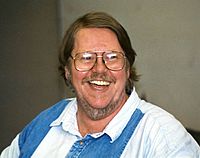Gardner Dozois facts for kids
Quick facts for kids
Gardner Dozois
|
|
|---|---|

Dozois at Clarion West Writers Workshop, Seattle, 1998
|
|
| Born | Gardner Raymond Dozois July 23, 1947 Salem, Massachusetts, U.S. |
| Died | May 27, 2018 (aged 70) Philadelphia, Pennsylvania, U.S. |
| Occupation | Editor, writer |
| Nationality | American |
| Period | 1970–2018 |
| Genre | Science fiction magazines, anthologies, short fiction |
| Notable works | Asimov's Science Fiction |
| Spouse | Susan Casper (m. c. 1970–2017, her death) |
Gardner Raymond Dozois (pronounced doh-ZWAH; July 23, 1947 – May 27, 2018) was a famous American science fiction author and editor. He was best known for creating The Year's Best Science Fiction book series, which he edited from 1984 to 2018. He also worked as the editor for Asimov's Science Fiction magazine from 1986 to 2004. Dozois won many important awards for his work, including multiple Hugo and Locus Awards almost every year. He also won the Nebula Award for Best Short Story twice. In 2011, he was added to the Science Fiction Hall of Fame, which is a big honor for people in the science fiction world.
Contents
Who Was Gardner Dozois?
Early Life and Career
Gardner Dozois was born on July 23, 1947, in Salem, Massachusetts. He finished high school in Salem in 1965. From 1966 to 1969, he served in the U.S. Army as a journalist. After his time in the Army, he moved to New York City. There, he started working as an editor in the exciting field of science fiction.
Dozois once shared that he started reading fiction to escape the small-town feeling of his home. His first story was published in 1966. After that, four more of his stories appeared in 1970, showing his talent for writing.
Later Life and Passing
In 2004, Dozois was in a taxi accident but thankfully made a full recovery. A few years later, in 2007, he had heart surgery. Gardner Dozois passed away on May 27, 2018, at the age of 70, due to an infection.
His Fiction Writing
As a writer, Gardner Dozois mostly wrote shorter stories. He was very good at it, winning the Nebula Award for Best Short Story twice. He won for "The Peacemaker" in 1983 and for "Morning Child" in 1984. His short stories have been collected in several books, like The Visible Man and Strange Days.
Dozois also wrote a few longer stories. He wrote one solo novel called Strangers in 1978. He also worked with other famous authors on novels, such as Nightmare Blue with George Alec Effinger and Hunter's Run with George R. R. Martin and Daniel Abraham. After he became an editor for Asimov's, he wrote less of his own fiction.
One of his short novels, "Counterfactual," won the Sidewise Award in 2006. This award is for stories that imagine what might have happened if history had been different. Dozois also wrote reviews of short stories for Locus magazine.
A long interview with Dozois, where he talked about all his published stories, was put into a book. This book, Being Gardner Dozois: An Interview by Michael Swanwick, won a Locus Award and was nominated for a Hugo Award.
His Work as an Editor
Gardner Dozois was most famous for his amazing work as an editor. He won the Hugo Award for Best Professional Editor an incredible 15 times in 17 years! This was from 1988 until he retired from Asimov's in 2004. George R. R. Martin, another very famous writer, said that Dozois was one of the most important and influential editors in science fiction history.
Before working with Asimov's, Dozois also worked for other science fiction magazines in the 1970s. These included Galaxy Science Fiction and If.
Dozois was also known for putting together many collections of short stories, called anthologies. Even after leaving Asimov's, he continued to edit his popular series, The Year's Best Science Fiction. This series was published every year since 1984. Readers of Locus magazine voted it the best anthology almost 20 times! He also worked with Jack Dann to edit many themed anthologies, which are collections of stories about a specific topic, like Cats or Dinosaurs.
Stories that Gardner Dozois chose for his yearly "best-of" books have won many top awards. As of 2015, these stories had won 44 Hugos, 41 Nebulas, 32 Locus awards, 10 World Fantasy awards, and 18 Sturgeon Awards.
Dozois was especially interested in adventure science fiction and space opera. He called these types of stories "center-core SF."
See also
 In Spanish: Gardner Dozois para niños
In Spanish: Gardner Dozois para niños
 | Jessica Watkins |
 | Robert Henry Lawrence Jr. |
 | Mae Jemison |
 | Sian Proctor |
 | Guion Bluford |

